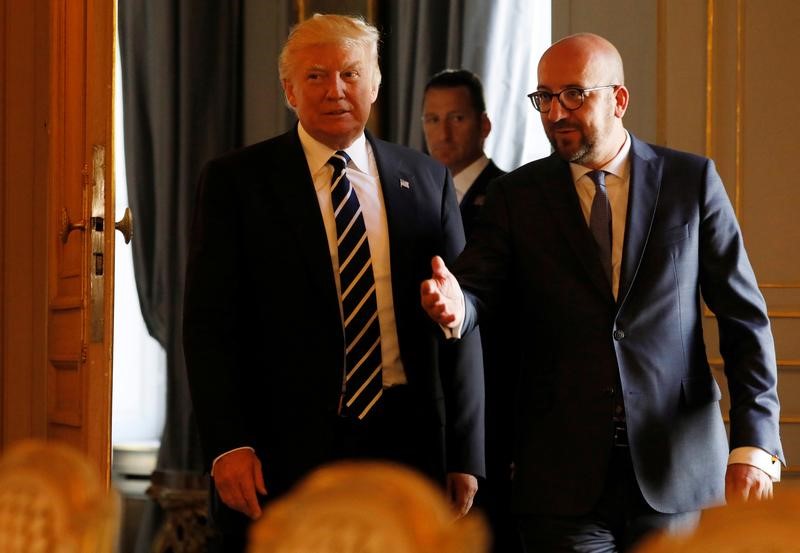By Steve Holland
BRUSSELS (Reuters) - He still has a chance for missteps, but so far on his maiden international trip, Donald Trump has managed to avoid major stumbles and has stuck to the script in a way his advisers have wanted him to do for months.
The U.S. president's rare display of discipline is in part a result of a desperate need for some smooth sailing. He began the trip in scandal mode, accused of impeding justice by firing former Federal Bureau of Investigation Director James Comey for not stopping a federal probe into his campaign's Russia ties.
Whether it will hold is unclear. He is in a portion of his nine-day trip, in Brussels for a NATO summit and later in Sicily for a Group of Seven conclave, where he will meet with European leaders who are at sharp odds with him on many issues.
Trump's change comes after increasingly loud alarm bells sounded from Republican congressional leaders, who say he must tamp down the tirades and tantrums that have contributed to a dismal public approval rating of about 38 percent.
Just in the past month alone, Trump used Twitter to issue a veiled threat to Comey, warning that he "better hope that there are no ‘tapes’ of our conversations before he starts leaking to the press!”
And when he fired Comey, White House aides said the move was based on a Justice Department recommendation that said Comey had mishandled the investigation into Democrat Hillary Clinton's handling of classified information last year.
Trump blew up that reason the next day, saying he had already decided to fire Comey when the Justice recommendation came in because the FBI man was a "showboat."
Trump's advisers planned the overseas journey trip in such a way as to keep the president busy with back-to-back meetings and appearances. This has given him little time for tweet storms and cable news watching. It sometimes has left him fatigued, as manifested when he canceled an evening forum with young people in Riyadh.
As they normally do when he travels, staff members have managed to provide him with some creature comforts, like keeping bags of potato chips at easy reach.
The president has limited his interactions with reporters, taking few questions. As a result, the Russia issue came up only once – during a meeting with Israeli Prime Minister Benjamin Netanyahu.
Initial plans for an end-of-the-trip news conference in Sicily have been set aside, meaning there are fewer chances for him to veer off script, but less opportunity to promote his achievements.
When Trump has talked to the news media, his responses to questions have been fairly brief and non-substantive. Asked about his meeting with Pope Francis on Wednesday at the Vatican, Trump kept it simple despite the differences between him and Francis on issues like climate change.
"Great...We had a fantastic meeting...We are liking Italy very much, and it was an honor to meet with the pope," Trump said.
He has also reined in some of his hyperbole. After boasting earlier this year that finding a peace agreement between the Israelis and Palestinians should not be all that hard, Trump acknowledged that maybe it would be hard after all.
"I've heard it's one of the toughest deals of all," he said. "But I have a feeling we're going to get there eventually. I hope."
Aides said most every word spoken was written carefully with some thought of the message that would be sent. Most speeches were performed with a Teleprompter to keep Trump from drifting off into his own ad libs.
"He understands that even the slightest phrasing can have big implications," said a senior White House official. "He's worked really hard on being directly involved in the preparation."
Secretary of State Rex Tillerson told reporters that behind the scenes, Trump has been calibrating his style to fit the leader who he is meeting and the urgency of the issue he is discussing.
"He tends to dial the urgency up and therefore the style dials up," Tillerson, noting that when talking to Israeli and Palestinian leaders, "He was very energized because he does feel there's a certain sense of urgency for these parties to finally get on with it."
Trump has been on script before only to lapse. Privately, aides realize this could happen again.
"He is who he is," one aide said. "He's definitely someone who speaks his mind."
Trump has found himself on this trip increasingly reliant on a core group of his inner circle: Son-in-law Jared Kushner, a top White House adviser; daughter Ivanka, who is Kushner's wife; Secretary of State Rex Tillerson; economic adviser Gary Cohn; national security adviser H.R. McMaster and deputy national security adviser for strategy, Dina Powell.
The more disciplined Trump was a victory for Kushner, who organized the trip around some specific objectives, such as a $110 billion arms deal for Saudi Arabia and Trump's visit to holy sites in Israel, including his visit to the Western Wall, a first for a U.S. president.

"We're very focused on the substance of the actions and then ultimately on delivering results," said a senior administration official.